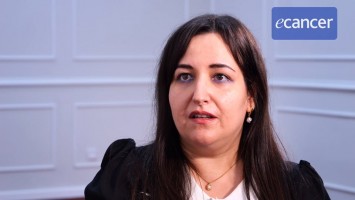I came to ESMO to present the 20 year follow-up data of the Dutch N4 study. High dose chemotherapy supported with haematopoietic stem cell transplantation compared to conventional chemotherapy showed promising results in first studies, however overall survival benefit was not confirmed in a meta-analysis in all patients. Overall survival benefit was confirmed in patients with ten or more involved axillary lymph nodes and patients with HER2 negative and triple negative breast cancer. As high dose chemotherapy did not become standard of care for breast cancer patients, Interest was lost and no follow-up studies were performed, we decided to collect and evaluate 20 year follow-up data of the largest study which was performed in the Netherlands between 1993 and 1999.
The N4 study randomised 885 women between 1993 and 1999, they all had invasive breast cancer and four or more involved axillary lymph nodes. Patients were one to one randomised to either five cycles of FEC chemotherapy or four cycles of FEC chemotherapy followed by one cycle of high dose chemotherapy and peripheral stem cell transplant.
To collect 20 year follow-up data we went back to the medical records of all patients, sent questionnaires to the general practitioners, oncologists and cardiologists in the primary hospitals and linked our data with several nationwide registries in the Netherlands, including Statistics Netherlands for the causes of death, the Netherlands Cancer Registry for the incidence of second cancer and PALGA, the Dutch Pathology Registry, to collect data on the breast cancer. This led to a comprehensive 20 year follow-up dataset.
The first analyses were done after a median follow-up of five years and did not show an improved disease free survival benefit in all patients. 20 year follow-up data confirmed no overall survival benefit in all patients with a hazard ratio of 0.89. However, we do see an important overall survival benefit in patients with ten or more involved axillary lymph nodes with a hazard ratio of 0.72 and a p-value for interaction of 0.046. In breast cancer subtypes we see a trend towards a better overall survival in patients with triple negative breast cancer with a hazard ratio of 0.67 and a p-value for interaction of 0.078. Although this is not statistically significant the 20 year survival estimate for patients with triple negative breast cancer who received high dose chemotherapy is 53% compared to 38% in patients who received FEC chemotherapy.
With a median follow-up of 20 years we saw no increase in the incidence of second cancers or major cardiovascular events between the two groups.
Although our data confirmed an important benefit for a group of patients with a high clinical need for better treatment, a prospective study with up front selection of patients with high risk breast cancer and preferably a deficiency of homologous recombination is needed to confirm our data. The SUBITO trial is currently ongoing and comparing high dose chemotherapy with the best standard of care at this moment.
Lastly, it would not have been possible to have a comprehensive 20 year follow up dataset without linkage with several nationwide registries that we have in the Netherlands. We are very thankful for that.








